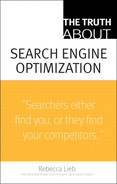Brainstorming exercises, together with surveying family, friends, clients, and co-workers, is a great place to start researching the right keywords for your website. Another integral part of this process is using the right tools.
One of the best places to start is with whatever third-party web analytics application you’re currently using to measure and monitor your site. (You are using an analytics solution, aren’t you?) Every commercial analytics package on the market, as well as free solutions such as Google Analytics, capture the actual keywords searchers used in search engines to find pages on your site and actually clicked. Usually, this information will be broken down between organic searches and clicks from paid search advertising campaigns, should you be running those.
Of course, analytics will only tell how the site is reacting to search engines now. They do not address its potential. A poorly optimized site displays very few keywords in the log files. Still, it’s a start.
The larger and more diverse the website, the longer the list of organic keywords will tend to be. Smaller, more specialized sites will have shorter lists. Either way, learning which keywords drive a site’s organic search traffic not only reveals a great deal about how searchers are finding the site, but also about how the site is showing up in organic search listings. The process will also reveal which pages are getting the most organic traffic, as well as which pages aren’t. This, in turn, might influence how individual pages are optimized.
Another metric that shouldn’t be overlooked by SEO professionals in a site’s log files is the time users spent on individual pages. This is particularly true if they arrived on a page directly from a search engine. Of course, the time-spent metric can have other implications in addition to those discussed here. When searchers arrive on a page, are they spending an acceptable amount of time there, perhaps proceeding deeper into the site, or do they bail out almost immediately? The amount of time a searcher should spend on a page varies greatly, of course. Common sense dictates that a publisher would want a visitor to invest time in, say, reading an article, while a “Contact Us” page might require much less of an investment of a visitor’s time.
Overall, a properly optimized page will ensure that a visitor spends an appropriate amount of time on it, or follows the links on the page. That metric indicates their needs are being satisfied because the page they arrived at is relevant to the expectations that were raised by the organic search listing.
The other primary destination for keyword research are the tools specifically designed for the purpose. An extensive list of these appears in Appendix A, “Resources,” (located online at www.informit.com/title/9780789738318) but let’s take a look at some of the most popular (and powerful) free, web-based keyword research tools:
• Google’s Keyword Tool is primarily intended to help Google’s paid search advertisers, but anyone optimizing a site for organic search should give it a whirl. Enter a term such as “life insurance,” and you get a list back of hundreds of related keyword phrases (life insurance, term life insurance, life insurance quote, and life insurance quotes are the top five at press time). Together with this information, Google displays the advertiser competition (the relative number of advertisers bidding for the term) and the relative search volumes for both the past month and year.
• Wordtracker’s free tool (a more robust commercial application is also available) collects search terms on a weekly basis from the major metacrawlers—Dogpile and Metacrawler. That same lookup reveals exactly how many searches were conducted on life insurance, term life insurance, whole life insurance, life insurance companies, and life insurance quotes over the past seven days across these search engines.
• Trellian’s Keyword Discovery Free Search Term Suggestion Tool collects data from dozens of search engines worldwide and tells you the annual number of searches for the top terms generated from its data: life insurance, life insurance settlement, term life insurance, whole life insurance, and life insurance quotes. Only the top-five results of each keyword query are displayed here. Further down the lists returned by these different tools are results that vary more widely for a variety of reasons. For instance, Google’s data is specific to its own search engine, whereas Wordtracker and Trellian collect search data from a broad variety of search sources. Search behavior is influenced by other factors, such as seasonality. You can bet terms such as “halloween costume” peak in the fall, and plummet in November, for example. And certainly those terms that are on the top of the list are far from the only ones for which a site might want to optimize. Optimization is not just a matter of going broad, if the goal is highly relevant, targeted traffic. Therefore, optimizing for “no exam life insurance” might not only be much easier, but also considerably more profitable, if that’s what the site in question is selling, promoting, or providing content about.
